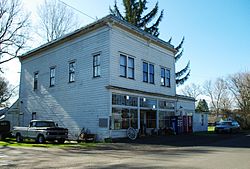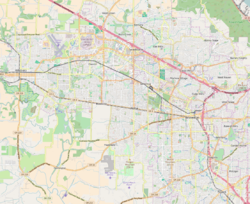Orenco, Oregon
| Orenco, Oregon | |
|---|---|
| Neighborhood | |

Former store in the older section of Orenco
|
|
| Etymology: OREgon Nursery COmpany | |
| Coordinates: 45°31′43″N 122°54′40″W / 45.52861°N 122.91111°WCoordinates: 45°31′43″N 122°54′40″W / 45.52861°N 122.91111°W | |
| Country | United States |
| State | Oregon |
| County | Washington County |
| City | Hillsboro |
| Time zone | Pacific |
| ZIP code | 97124 |
| Area code(s) | 503 and 971 |
Orenco (or en koh) is a former company town in Washington County, Oregon, United States, located between Hillsboro and Aloha. The former community of Orenco now forms the Orenco neighborhood in Hillsboro, which is the site of the Orenco Station housing development.
The community was established in 1905 as a company town by the Oregon Nursery Company, within a 1200-acre (4.9 km2) area owned by the company. The name Orenco is a composite of the company's initials. The Oregon Electric Railway established Orenco Station in 1908, and Orenco post office operated from 1909 to 1963. Of the original town, the church, a gas station, general store, and many original dwellings are still standing today. The Oregon Nursery Company shut down during the depression. Orenco later became part of Hillsboro. The company was responsible for introducing the Orenco Apple, a dessert apple, in the early 20th Century.
Orenco is located in the Tualatin Valley, with Rock Creek and other smaller streams running through the area. Major roads in the area include U.S. Route 26, Cornelius Pass Road, Cornell Road, NW 231st Avenue, and Baseline Road.
Orenco's approximate location is northeast Hillsboro, north of Baseline Road, south of Cornell Road, west of Cornelius Pass Road, and east of Shute Road. Unlike the town of Orenco, the present-day neighborhood of the same name extends north of Cornell Road, with the Orenco Station area.
European American pioneers first arrived in the Orenco area in the mid-1850s, after the Donation Land Claim Act of 1850 encouraged settlers to travel to Oregon. The Orenco area was cleared by Chinese laborers employed by a number of local farmers.
...
Wikipedia



